Fullmetal Alchemist (2003) and Fullmetal Alchemist: Brotherhood (2009) are among the top-ranked anime and manga series ever. They share a name, main characters, and even the same starting point, but don’t be fooled because it is not the same.
The Elric brothers are on a journey to restore their bodies after performing the forbidden Human Transmutation ritual.
In Fullmetal Alchemist, everything revolves around alchemy, and as they continue their journey, they find out more about the dark history of the state they are living in. Both versions of FMA and FMAB have their unique way of telling the story, but there are some massive differences important to note.
These are two very different shows, and if you’re wondering which one to watch, or why fans still debate which is better, you’ve come to the right place here at DLCBrothers. Let’s break it down.
FMA: Brotherhood Is Closer to the Manga
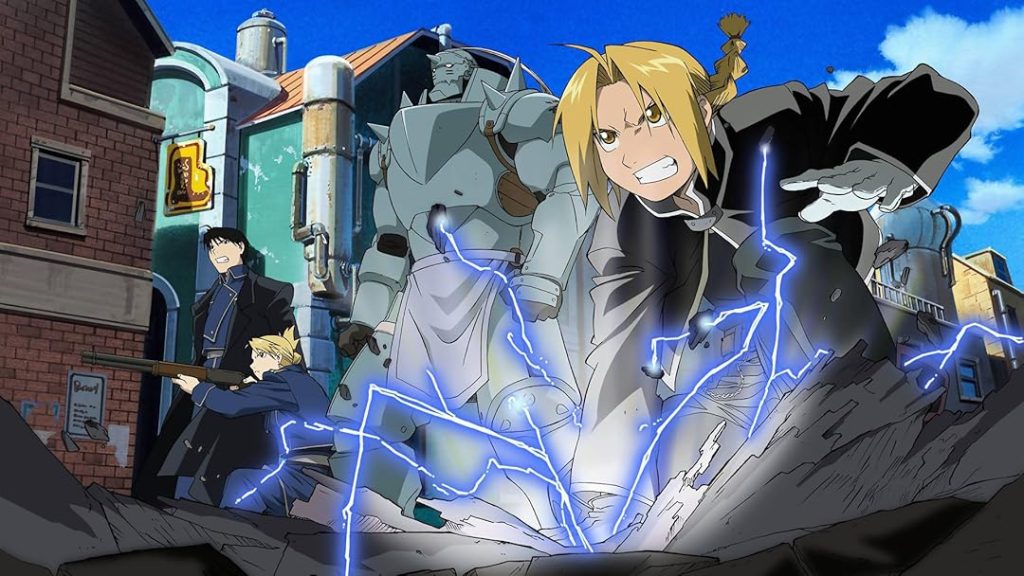
The biggest difference between the two is how closely they follow the manga chapters from Hiromu Arakawa’s Fullmetal Alchemist manga.
The Fullmetal Alchemist (2003) anime began production when only five volumes of the manga were released. Because of that, it starts off similar to the manga but eventually goes in its own direction, creating an original plot with new villains, character arcs, and a completely different ending. Studio Bones had to fill in the blanks while there were no manga chapters to adapt; nonetheless, they did an amazing job.
“Brotherhood, which was released in 2009, was developed after the manga had ended.” This allowed Studio Bones to adapt the story exactly as Arakawa intended. In fact, Arakawa was more involved in Brotherhood’s production, ensuring it stayed true to her vision.
So this means that Fullmetal Alchemist Brotherhood is the better adaptation, in terms of telling the original story.
By the time the FMA series wrapped up in October 2004, just eight of the eventual 27 volumes had been published.
Brotherhood aired between 2009 and 2010 and concluded right alongside the manga’s final chapter, allowing for a much more faithful adaptation. In fact, after episode 10 in Brotherhood and around episode 26 in the original series, the two versions tell entirely different stories.
If you want a reliable adaptation with all the manga’s plot twists and full storyline, Brotherhood is the way to go. But if you’re curious about an alternate path with a darker, emotional twist, then the classic FMA is your pick.
How the Storylines Differentiate
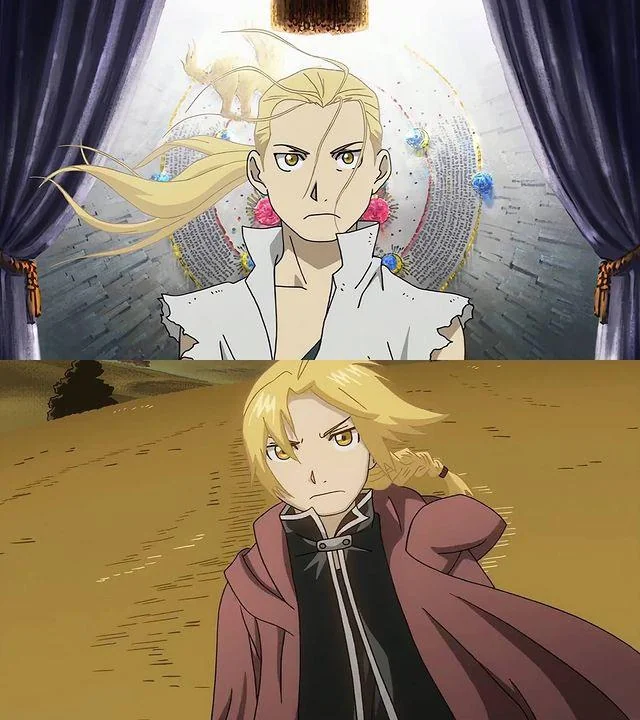
Both series begin with the Elric brothers’ tragic attempt to bring their mother back using forbidden alchemy. Both versions included these physical and emotional scars. However, their next series of events is dramatically different after this first action.
The original Fullmetal Alchemist expands on side characters and adds entirely new content not found in the manga. Characters like Barry the Chopper and Shou Tucker get more screen time. While Rose is dramatically different, shifting from a minor role to a central figure in the villain Dante’s plan.
Brotherhood, by contrast, sticks closely to the manga, introducing characters only when needed and omitting additions like Russell and Fletcher Tringham from the light novels.
Some key manga characters, such as Olivier Mira Armstrong, never appear in the 2003 series. And while Brotherhood gives women like Winry and Riza more agency and development, the original often keeps them in the background, which fans have long criticized as a missed opportunity.
In FMA (2003), the story diverges after episode 25. The antagonist becomes Dante, a mysterious immortal with ties to their father, Hohenheim. The tone becomes more philosophical and personal. The story concludes in the movie Conqueror of Shamballa, taking Ed into an alternate version of WWII-era Europe.
In Brotherhood, the antagonist is Father, a powerful alchemist with god-like ambitions. The story expands far beyond the brothers’ journey and into political conspiracies, secret histories, and world-altering stakes. It ends with a good resolution for almost every important character.
The Homunculus: Tragedy vs. Design
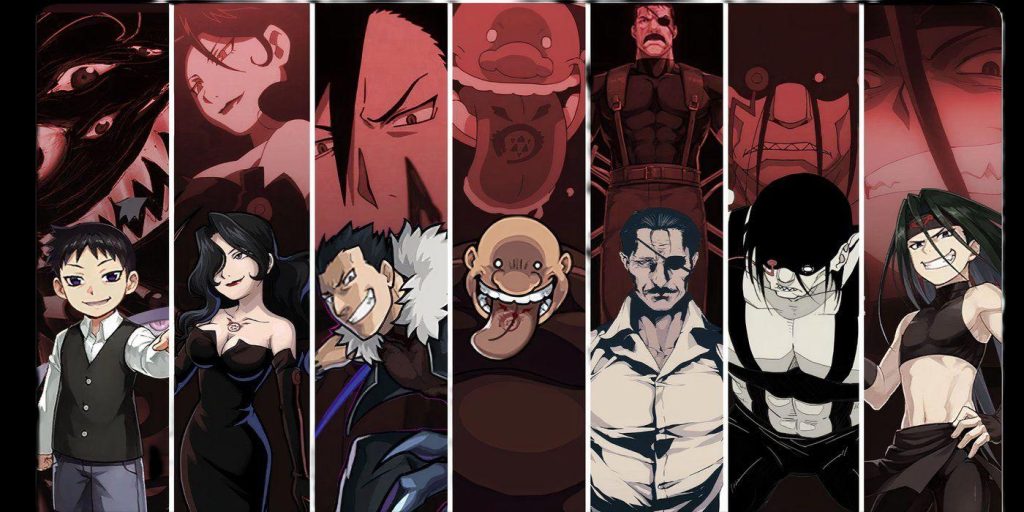
One of the most notable differences between Fullmetal Alchemist (2003) and Brotherhood is how each series portrays the Homunculus; these are the main villains in both versions.
In the 2003 anime, Homunculi are born from failed human transmutations. Each is the tragic result of an alchemist trying to bring a loved one back to life. These creatures have emotional ties to the protagonists.
For example, Sloth is a distorted version of Ed and Al’s mother, and Wrath is the child their mentor, Izumi, lost during childbirth. Their humanity haunts them, and in a cruel twist, they’re vulnerable when confronted with remnants of their past selves.
In Brotherhood, the Homunculi are entirely different in origin and purpose. Created artificially by the true antagonist, Father, they represent the seven deadly sins and act as his loyal agents. Their identities also shift: Wrath becomes Fuhrer Bradley, Pride is his son, and Sloth is a mindless brute. While Lust, Gluttony, and Envy appear in both versions, their roles differ greatly. Lust, for instance, is a major villain in FMA but is the first to die in Brotherhood.
The difference is in their creators: Dante in the original and Father in Brotherhood. Dante, once Hohenheim’s lover, stumbles upon Homunculi and uses them to extend her own life. Father, by contrast, is a godlike figure obsessed with control and perfection, using the Homunculi as pawns in a grand, calculated plan.
Ultimately, both interpretations serve different goals. FMA leans into themes of grief, regret, and lost humanity, while Brotherhood explores power, ambition, and philosophical conflict on a larger scale.
Pacing, Tone, and Worldbuilding
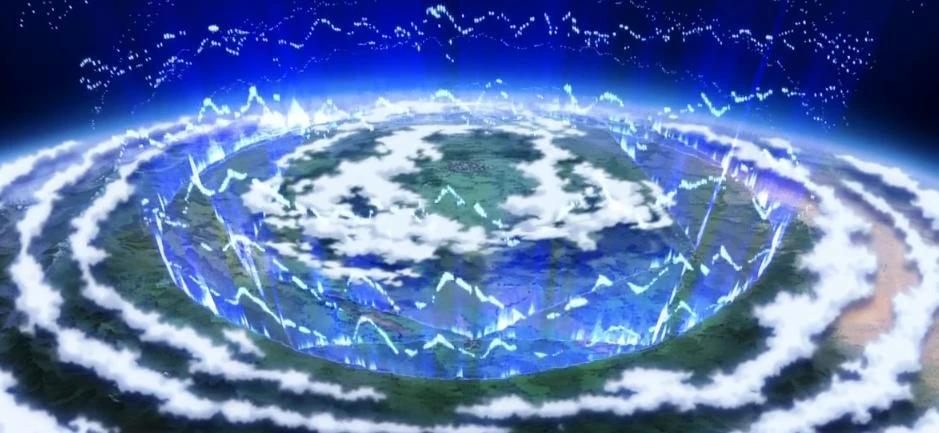
Both FMA and FMAB are also different in how they tell their stories based on their tone, worldbuilding, and story pacing.
FMA takes its time. It’s a slower-paced series, with episodes focused on character growth, ethical dilemmas, and emotional consequences. So this version is more introspective and grounded. Many fans say it hits harder emotionally.
Brotherhood, by contrast, is speedy and bold. The first 10 episodes fly by to skip already-covered material, then dive into new story arcs at a faster pace. It introduces a wider world, including nations like Xing, military corruption, and ancient history from Ishval.
One is like a quiet novel you take time to read. While the other is more of an epic saga that continues to pull you in.
Character Development and Representation
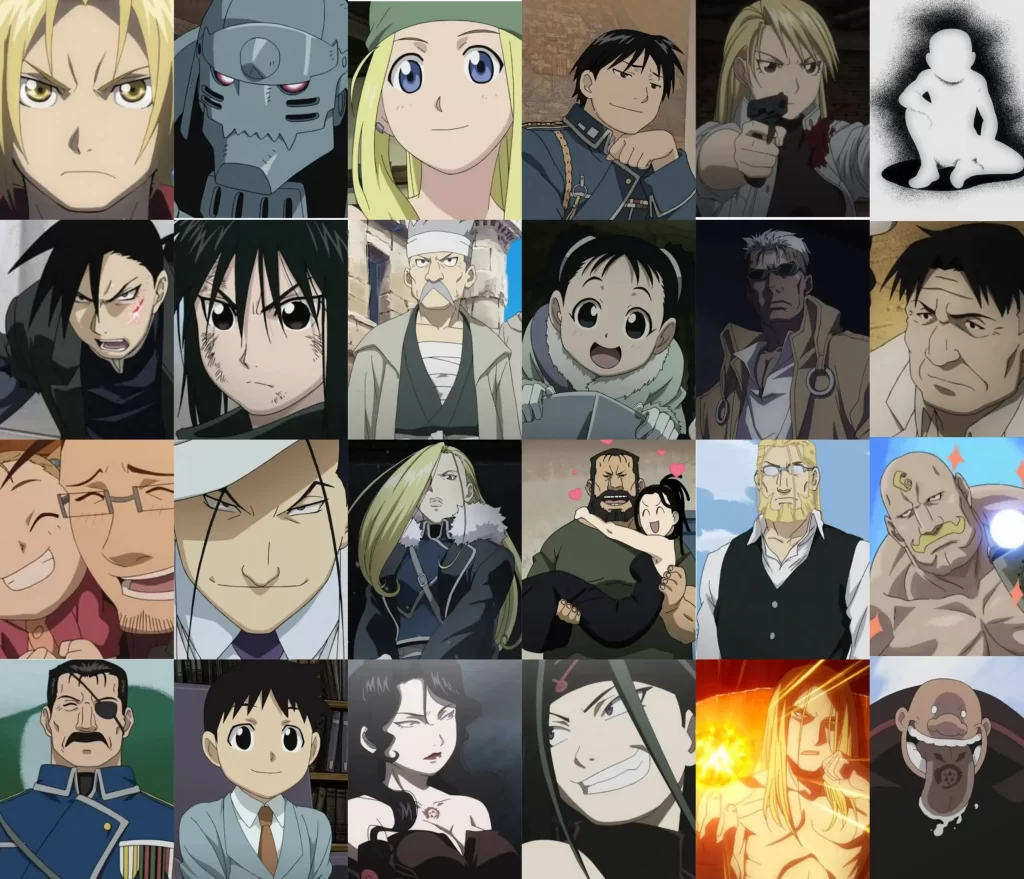
Some characters get more attention or more justice in one version than the other. For example, characters like Roy Mustang, Winry, and Riza are portrayed differently.
In FMA, female characters like Winry and Riza are often sidelined. They appear frequently but don’t get much development outside supporting roles.
In Brotherhood, they shine. Winry is a skilled engineer with her own story arc. Riza is a tactical powerhouse. New characters like Olivier Mira Armstrong add even more female presence and power to the story.
Also, FMA adds and reshapes certain characters. Rose, for instance, starts off insignificant but ends up becoming a big asset to Dante’s plan.
Music and Visuals
Both series have different themes and opening songs, but Fullmetal Alchemist Brotherhood has more iconic openings that are still listened to today.
FMA (2003) features a melancholy, orchestral score by Michiru Ōshima, which fits its emotional tone. Brotherhood’s music, composed by Akira Senju, is cinematic, high-energy, and moving — especially in climactic scenes.
Visually, Brotherhood has the edge due to newer animation. Action scenes are sharper and smoother. FMA’s older style holds up well, though especially with its darker and more atmospheric scenes.
Voice Acting & Dubs
Both series feature top-tier English dubs, and fans are always discussing which is better.
FMA’s Ed, voiced by Vic Mignogna, became iconic for many early fans. Brotherhood retains much of the same cast but features even stronger performances overall.
If you’re watching dubbed, either version is excellent. Sub-fans will find consistent, emotional voice acting in both. Some moments just can’t be done more epically, whether it’s Japanese or English.
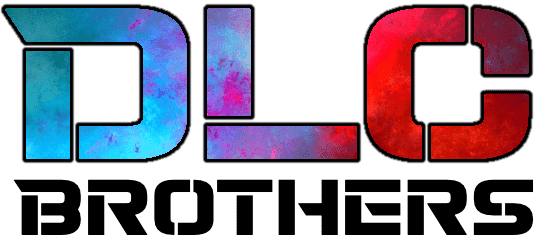
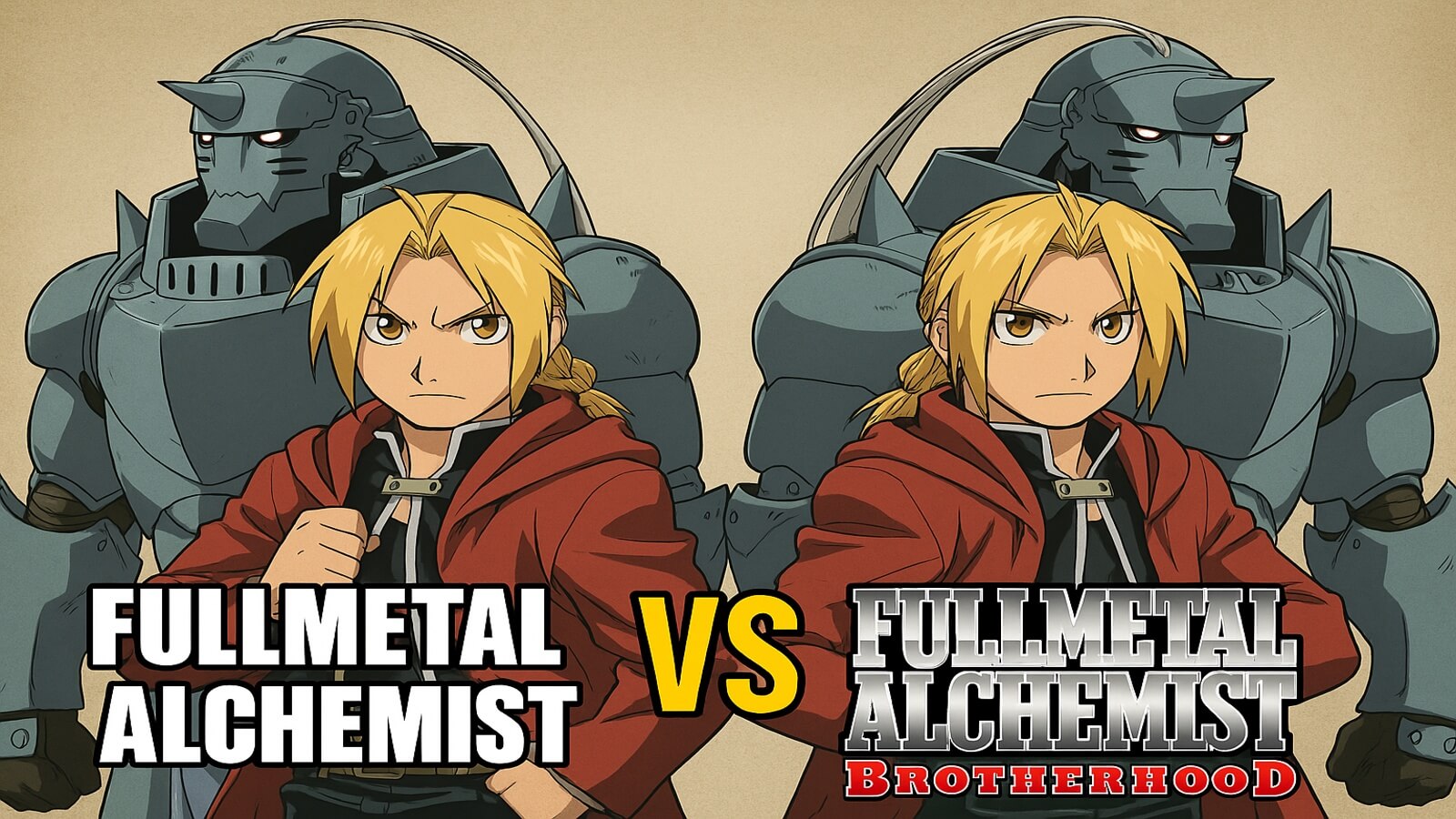
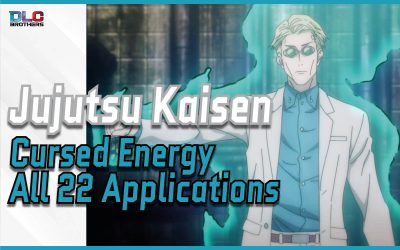
0 Comments